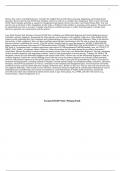1
Review this week’s Learning Resources. Consider the insights they provide about assessing, diagnosing, and treating mood
disorders. Review the Focused SOAP Note template, which you will use to complete this Assignment. There is also a Focused
SOAP Note Exemplar provided as a guide for Assignment expectations. Review the video, Case Study Petunia Park. You will
use this case as the basis of this Assignment. In this video, a Walden faculty member is assessing a mock patient. The patient will
be represented onscreen as an avatar. Consider what history would be necessary to collect from this patient. Consider what
interview questions you would need to ask this patient.
Case Study Petunia Park Develop a Focused SOAP Note, including your differential diagnosis and critical-thinking process to
formulate a primary diagnosis. Incorporate the following into your responses in the template: Subjective: What details did the
patient provide regarding their chief complaint and symptomatology to derive your differential diagnosis? What is the duration
and severity of their symptoms? How are their symptoms impacting their functioning in life? Be sure to review the Learning
Resources before completing this activity. Click the weekly resources link to access the resources. WEEKLY RESOURCES
(https:/waldenu.instructure.com/courses/147508/modules/items/5781480) TO PREPARE THE ASSIGNMENT 12/14/24, 10:24
PM Week 4: Assignment https://waldenu.instructure.com/courses/147508/assignments/1906580?module_item_id=5781475 2/7
NRNP_6665_Week4_Assignment_Rubric Objective: What observations did you make during the psychiatric assessment?
Assessment: Discuss the patient’s mental status examination results. What were your differential diagnoses? Provide a minimum
of three possible diagnoses with supporting evidence, listed in order from highest to lowest priority. Compare the DSM-5-TR
diagnostic criteria for each differential diagnosis and explain what DSM-5 criteria rules out the differential diagnosis to find an
accurate diagnosis. Explain the critical-thinking process that led you to the primary diagnosis you selected. Include pertinent
positives and pertinent negatives for the specific patient case. Plan: What is your plan for psychotherapy? What is your plan for
treatment and management, including alternative therapies? Include pharmacologic and nonpharmacologic treatments, alternative
therapies, and follow-up parameters as well as a rationale for this treatment and management plan. Also incorporate one health
promotion activity and one patient education strategy. Reflection notes: Reflect on this case. Discuss what you learned and what
you might do differently. Also include in your reflection a discussion related to legal/ethical considerations (demonstrate critical
thinking beyond confidentiality and consent for treatment!), social determinates of health, health promotion, and disease
prevention that takes into consideration patient factors (such as age, ethnic group, etc.), PMH, and other risk factors (e.g.,
socioeconomic, cultural background, etc.).
Focused SOAP Note: Petunia Park
, 2
Focused SOAP Note: Petunia Park
Subjective:
Based on the case study, Petunia Park complains of quitting medications whenever she
feels like they are squashing her. As per her history, she experienced difficulties sleeping when
she was a teenager, which led to hospitalization. During that time, she failed to sleep for five
days, heard things in her mind, and had racing thoughts. Park states that she tried committing
suicide in 2017, and has been smoking a pack per day. She also explains experiencing manic
episodes, during which she has a lot of energy to do accomplish a lot of things, becomes very
creative, has lots of sex, and gets to sleep a maximum of three hours in 24 hours for a week. In
other times, she experiences low episodes, during which she has no motivation, does not want to
get out bed, has no energy, feels low in creativity, and sleeps for about 12 to 16 hours a day.
Notably, Park claims that she has depression and anxiety. When it comes to her family, Park
claims that her mother was seen as crazy and she was diagnosed with bipolar, her father was
imprisoned for drugs, and her brother is a little schizo.
Objective:
During the psychiatric assessment, I observed that Park gets easily irritated. For instance,
she gets irritated after Dr. Moore asked about suicidal thoughts the second time. Additionally, I
have noted that she has mood swings. At one moment, she gets arrogant after the doctor asked
about family history; the next moment she is laughing after being asked about her sex life.
Assessment:
Bipolar I disorder




